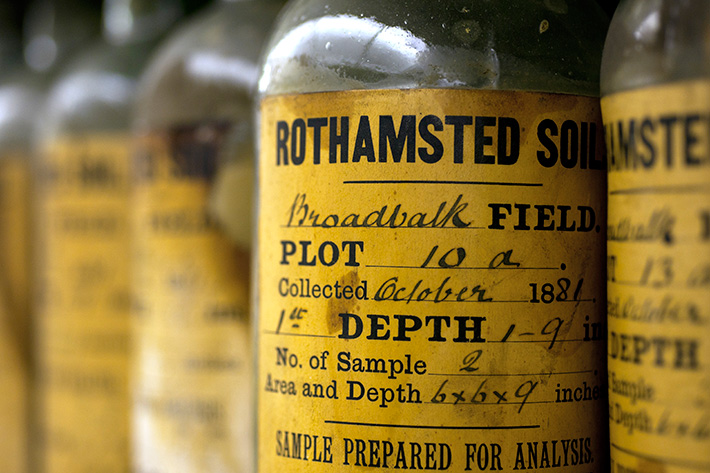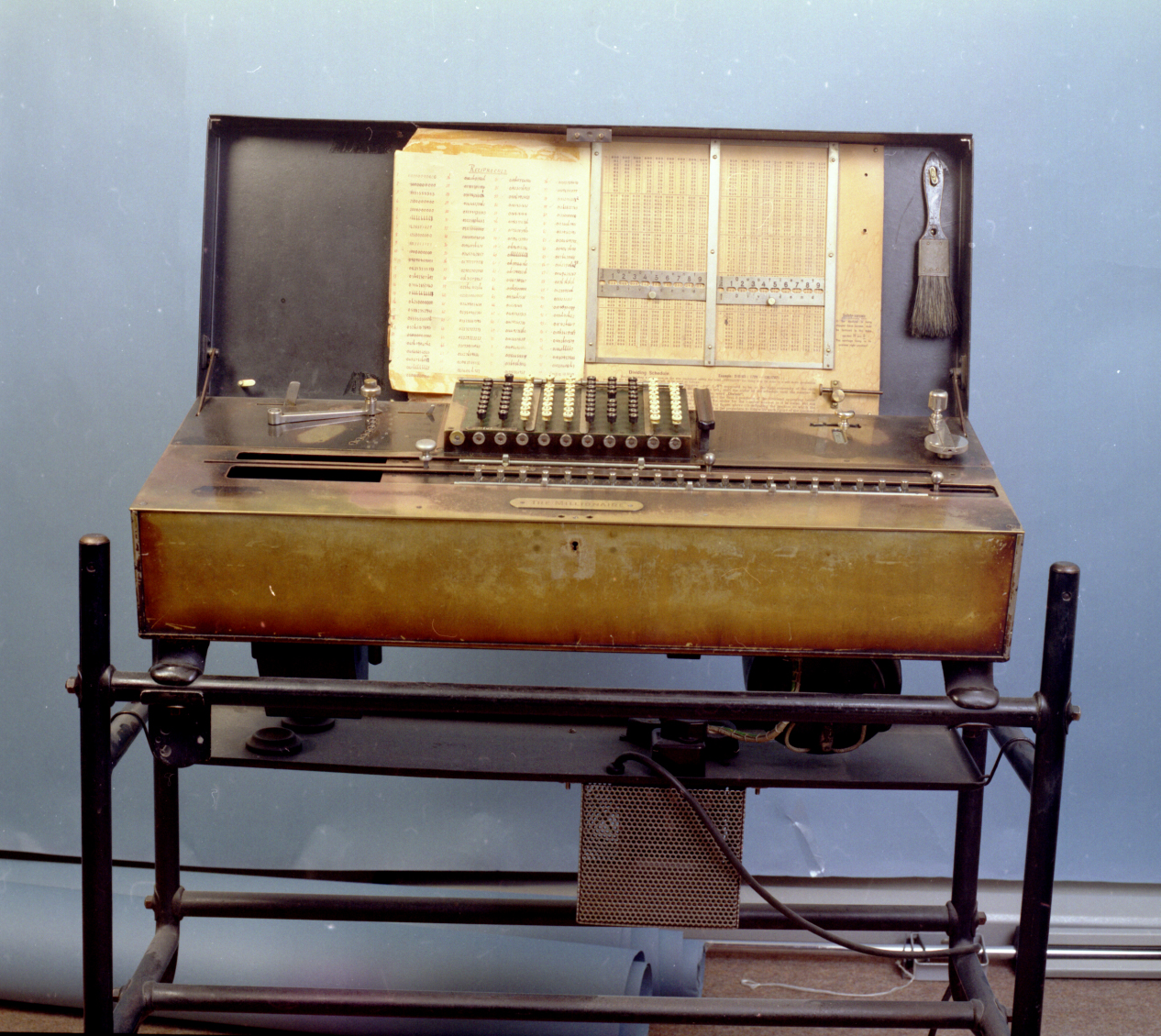The big picture: using wildflower strips for pest control
Data experts from all over the world will gather at the birthplace of the information age this week to mark its 100th anniversary, and to discuss the impact new innovations in data analysis will have on biology and medicine over the next century.
Delegates at the International Biometric Society’s conference being held here at Rothamsted will hear lectures relating to the past, present and future of agricultural statistics, as well as a lecture in honour of the achievements of the mathematician and geneticist, Sir Ronald Fisher.
Fisher was the first in a long line of eminent statisticians at Rothamsted whose analysis of long-term data on crop yields ultimately – and surprisingly - led to the modern digital world.
According to Andrew Mead, Rothamsted’s Head of Applied Statistics, Fisher was a flawed genius whose work revolutionised the way we extract knowledge from data
“What do financial markets, weather forecasting, insurance premiums and medical trials all have in common? The answer is none of them would be credible, or even possible, without the underpinning statistical methods developed at, or stimulated by, Rothamsted over the last century.
“And big data might be the new big thing driving science and business, but many of the analyses and algorithms that make modern life possible can trace their roots back a hundred years - to a small band of scientists working to improve wheat yields.
“In other words, your Spotify playlist, your Google searches and your Amazon shopping are in large part possible because of research to understand and interpret data collected from Victorian field experiments involving manure and fertilizer.”
In 1919, the as-then Rothamsted Experimental Station statistics department opened under the auspices of Fisher, who had been hired to assess what useful information could be extracted from the huge amounts of data amassed from several long running crop trials.
Though very small and relatively simple in comparison with today’s big data, analysis of these datasets was a major challenge at that time.
It was here that Fisher devised and developed the concepts for the design of experiments and small-sample data analysis that are still taught and used the world over. His 1925 book, Statistical Methods for Research Workers, is one of the 20th century's most influential books on statistical methods.
“What Fisher achieved was in large part thanks to Rothamsted’s vast and unique data sets. By the time he arrived, the institute already had over 70 years’ worth of experimental data and samples of soils and crops,” says Mead.

“Perhaps Fisher’s key contribution was identifying that there were problems with the way the experiments had been designed, and that led to developments in the theory for the design of experiments – making sure researchers could get the maximum amount of information from the, often limited, resources available for their studies.
“In the modern world, where mass data collection is all too easy, and the analysis of them is possible without proper thought to the methods used and assumptions being made, the application of Fisher’s principles for the design of experiments is still critical to avoid bias and provide reliable conclusions.
“Fisher was perhaps the first statistician to think about statistical methods as a means of providing evidence or information, rather than just as mathematical problems. And one hundred years later, that’s exactly what my statistician colleagues and I are doing - applying statistical methods to help people to find solutions to problems.”
The 7th Channel Network Conference, hosted by Rothamsted, will run from Wednesday 10th July 2019 to Friday 12th July 2019, and will bring together statisticians to discuss the newest statistical methodology for the analysis of biological and medical data.
Roughly 150 delegates at the conference will get a chance to visit some of the crop trials that inspired Fisher, and which are still running today, over 170 years on from being started.
They will also be shown the sample archive, which includes over 300,000 samples of grain, straw, soil, fertilisers and manures, that kick started the science of plant nutrition, and which Fisher also would have worked on.
In addition, they will be able to see one of Fisher’s first purchases as head of department, his ‘Millionaire calculator’, which at £200 was equivalent to six months of his own salary.

After Rothamsted, Fisher went to University College London and then Cambridge University, and today he is remembered globally, not just as the father of modern statistics, but also for developing key genetic and evolutionary theories.
By the time Fisher left the Institute in the thirties, the Rothamsted statistics department was thriving – so much so that during WWII it was pressed into service surveying food production and fertiliser use, as well as performing research for the RAF.
Post war, Rothamsted played yet another pioneering role, this time in the computerisation of statistics – including the UK’s first civilian use of a computer for research, and the development of the data analysis software, GenStat.
The roll-call of notable Rothamsted statisticians includes Oscar Irwin (a pioneer of statistics in clinical medicine), Frank Yates (Fisher’s successor and key to the development of statistical computing), John Nelder (a leader in the field of data analysis software) and Frank Anscombe (who founded the statistics department at Yale University).
Other past members of the Statistics Department at Rothamsted went on to contribute to the development of medical statistics, and to fill major positions in academic statistics group across the UK and beyond.
Fisher was also one of the founding fathers of the (International) Biometric Society, serving as its first international President from 1947 to 1949, a role also performed by Andrew Mead 60 years later.
More information on the conference https://biometricsociety.org.uk/events/cnc2019, the International Biometric Society https://www.biometricsociety.org/about/ and the Fisher Memorial Trust http://www.senns.demon.co.uk/FisherWeb.html

Statistician

Statistician
Rothamsted Research is the longest-running agricultural research institute in the world. We work from gene to field with a proud history of ground-breaking
discoveries in areas as diverse as crop management, statistical interpretation and soil health. Our founders, in 1843, were the pioneers of modern
agriculture, and we are known for our imaginative science and our collaborative approach to developing innovative farm practice.
Through independent research, we make significant contributions to improving agri-food systems in the UK and internationally, with
economic impact estimated to exceed £3 bn in annual contribution to the UK economy. Our strength lies in our systems approach, which combines strategic research,
interdisciplinary teams and multiple partnerships.
Rothamsted is home to three unique National Bioscience Research Infrastructures which are open to researchers from all over the world:
The Long-Term Experiments,
Rothamsted Insect Survey and the
North Wyke Farm Platform.
We are strategically funded by the Biotechnology and Biological Sciences Research Council (BBSRC), with additional support from other national and
international funding streams, and from industry. We are also supported by the Lawes Agricultural Trust (LAT).
The Biotechnology and Biological Sciences Research Council is part of UK Research and Innovation, a non-departmental public body funded by a grant-in-aid
from the UK government.
BBSRC invests to push back the frontiers of biology and deliver a healthy, prosperous and sustainable future. Through our investments, we build and support a vibrant,
dynamic and inclusive community which delivers ground-breaking discoveries and develops bio-based solutions that contribute to tackling global challenges,
such as sustainable food production, climate change, and healthy ageing.
As part of UK Research and Innovation (UKRI), we not only play a pivotal role in fostering connections that enable the UK’s world-class research and innovation system
to flourish – we also have a responsibility to enable the creation of a research culture that is diverse, resilient, and engaged.
BBSRC proudly forges interdisciplinary collaborations where excellent bioscience has a fundamental role. We pioneer approaches that enhance the equality, diversity,
and inclusion of talent by investing in people, infrastructure, technologies, and partnerships on a global scale.
The Lawes Agricultural Trust, established in 1889 by Sir John Bennet Lawes, supports Rothamsted Research’s national and international agricultural science through the provision of land, facilities and funding. LAT, a charitable trust, owns the estates at Harpenden and Broom's Barn, including many of the buildings used by Rothamsted Research. LAT provides an annual research grant to the Director, accommodation for nearly 200 people, and support for fellowships for young scientists from developing countries. LAT also makes capital grants to help modernise facilities at Rothamsted, or invests in new buildings.